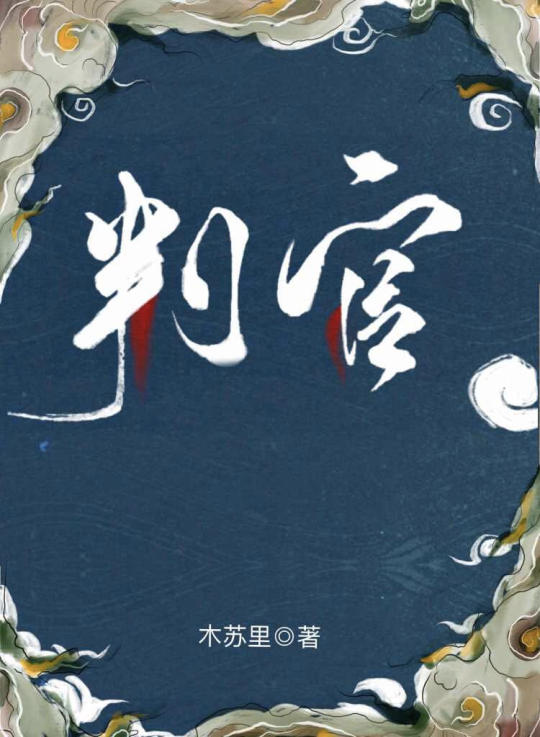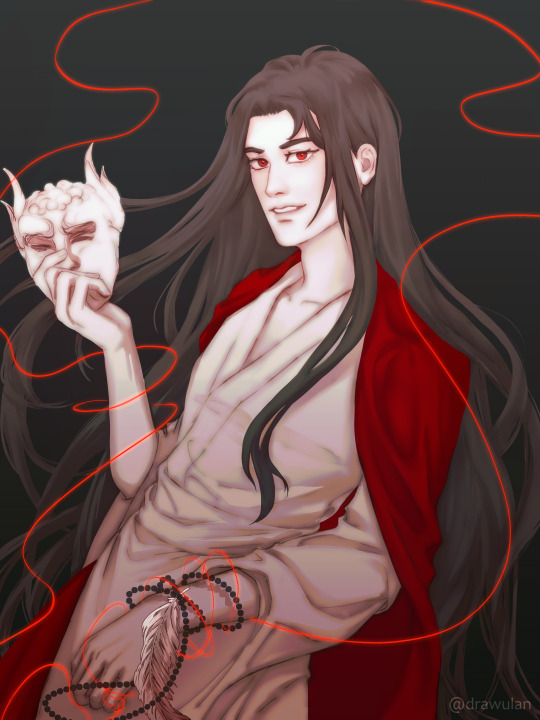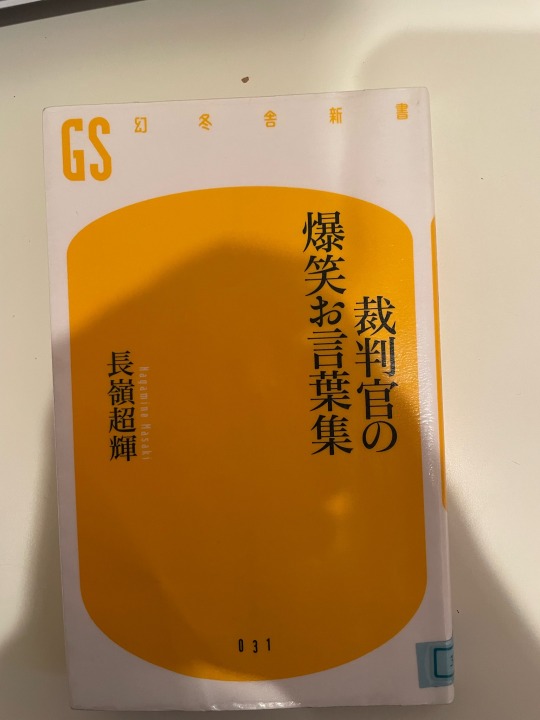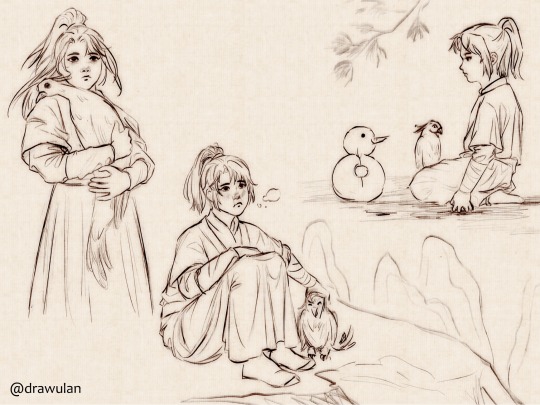#判官
Explore tagged Tumblr posts
Text

freeform prompt for @danmei-action !! im obsessed w that one official art of him with his mask,,
19 notes
·
View notes
Text
Have You Read This Web Novel?

If you’re in the process of reading this web novel, please choose whichever option best fits your situation. You do not have to be completely finished with it to answer “yes.”
If you’ve never heard of it, please read the description below the cut!
See similar polls and results here!
Novel Updates:
There once existed an honorable founder of this panguan school of cultivation. His reputation was illustrious, but nowadays nobody dared to mention him. Even if they did, all they said was, “He met a miserable end.” Only Wen Shi still abided by the rules. Every day, he would pay respects to the founder’s ferocious, colorful portrait, but because of that he ended up summoning a sickly tenant. The tenant stood in front of the portrait and asked, “Who drew this?” Wen Shi: “Me.” Don’t ask. If you do, you’ll just end up feeling touched.
Carrd:
Panguan is a modern cultivation!AU featuring thousand-year pining and soul-ferrying supernatural shenanigans, topped off with a dash of horror/mystery and master/disciple dynamics.
7 notes
·
View notes
Text


He knelt amidst it all, and kissed the world of mortals.
他跪坐其间,吻了红尘。
33 notes
·
View notes
Text
In the array, illusions layered the field. Unkempt shrubs littered the ground. Eight hundred miles spans a sea of blood, winding, wreathing. Mouldering wood grew across. He knelt amidst, and kissed the earth.
阵中幻境重重,荒草遍地。八百里血海蜿蜒、朽木丛生。
他跪坐其间,吻了红尘。
#chen budao kissing wen shi#danmei#panguan#mu su li#musuli#判官#I'm not crying you are#it is so pretty and of course “red dust” does not only mean the earth it also means chen budao#i love wenshi so much#fate translates#fate creates
14 notes
·
View notes
Text
人对世间有太多悲喜、爱恨、留恋与不舍时 一旦成執,一不小心…… 就会在这近乎于心魔的影响中,变成另一个人……

如果形成「笼」,简直难以想象! 因此,我在看每个案例(笼)时 初看都挺可怖—— 但到了剖析完笼主背后的故事时
又觉得:啊~原来都是个痴儿。

1 note
·
View note
Text
Wipe the blood

49 notes
·
View notes
Text

֍ Justice – Card XI
TITLE: The Pearlscale Magistrate / 珠秤判官 (Zhū Chèng Pànguān)
MYTHIC ARCHETYPE: Mazu’s Ghost-light Admiral
TAOIST PARALLEL: Bao Zheng (包拯), the legendary "Iron-Faced Judge" of Song Dynasty, merged with Mazu’s Tide-Scribe—a dead scholar who records karmic debts in coral ledger books.
PIRATE TWIST: His court is an empty beach at low tide – the accused have only until the waters return to prove their innocence.
WHY JUSTICE? He doesn’t need to be alive to see guilt; he listens to how the waves echo in a liar’s chest.
TAOIST PIRATE SYMBOLISM
KEYWORDS (Upright):
Cháo píng (潮平, "tide-balance")—natural law as inevitable as moonpull.
The coral gavel (珊瑚槌, shānhú chuí)—its strike summons truth-telling eels.
"Saltwater oaths" (鹹水誓, xiánshuǐ shì)—broken vows crystallize on the tongue.
KEYWORDS (Reversed):
Wèi zhāng (偽漲, "false tide")—fabricated evidence.
Yāo gào (妖告, "phantom testimony")—lies that dissolve like sea foam.
The hollow pearl (空珠, kōng zhū)—justice delayed until the next typhoon.
INTERPRETATION: This card is karma’s tide table. The Magistrate’s verdicts aren’t decided—they’re revealed by how the ship lists.
RITUAL: THE CORAL LEDGER (珊瑚賬, Shānhú Zhàng)
(Inspired by Ming maritime law and Taoist debt-reckoning rites)
PURPOSE: To weigh a moral dilemma with tidal impartiality.
MATERIALS:
Two whale ear bones (or uneven stones).
A length of fishing net (or red thread).
Saltwater in a brass bowl.
Ink & brush (or a sharp shell).
STEPS:
Carve your dilemma onto the bones—one side per bone.
Tie them to the net, creating a primitive scale. Suspend it over the bowl.
Pour saltwater until one bone sinks and the other rises.
The lighter bone holds your true path.
Bury the sunk bone—its truth is settled. Carry the risen bone for 3 tides as counsel.
PARALLEL MYTHOLOGY
TITLE: The Arbiter of Dreams / The Scale of the Reed Beds
MYTHIC ARCHETYPE: Nanshe (Sumerian Goddess of Social Justice)
REGION: Ancient Mesopotamia (Sumer)
FORM: A powerful goddess, daughter of Enki (the god of wisdom, magic, and fresh water). Her sacred animals were birds and fish. Her center of worship was in the city of Lagash, a city of canals and marshes near the Persian Gulf.
TALE: Nanshe was no distant sky-god. Her justice was compassionate and hands-on. She was known as the one "who knows the orphan, who knows the widow, knows the oppression of man over man." She was the protector of the socially vulnerable. Furthermore, she was a goddess of prophecy and the chief interpreter of dreams, using them to reveal truths and render fair judgments. At the New Year festival, people would come to her temple to have their dreams interpreted and their disputes settled.
WHY JUSTICE? Nanshe is Justice in action. She represents the search for truth (interpreting dreams), the weighing of actions (judging disputes), and the upholding of fairness, with a special emphasis on protecting those who cannot protect themselves. Her connection to water places her perfectly in our deck, and her role as a dream interpreter gives a mystical, intuitive layer to the cold logic often associated with the Justice card.
INTERPRETATION THROUGH NANSHE: This card signifies that a moment of truth has arrived. All actions have consequences, and now is the time they will be weighed. Nanshe asks you to act with absolute integrity. Are you being fair to others and to yourself? Are you honoring your responsibilities, especially to those who are vulnerable? The truth of the situation will be revealed, perhaps in an unexpected way, like a dream. Be prepared to face the clear, unvarnished facts and act accordingly.
THE RITUAL OF NANSHE'S SCALES (For Seeking a Just Path)
OBJECTIVE: To find a fair and true perspective on a situation where you are conflicted or where a difficult judgment must be made.
MATERIALS:
Two identical bowls or cups.
Two small, equal-sized pieces of paper and a pen.
Water.
AN OFFERING: A small amount of grain (barley, flour) or a piece of bread, representing the agricultural staples of Mesopotamia.
STEPS:
STATING THE CASE: Find a quiet place. Fill both bowls with an equal amount of water. On one piece of paper, write down one side of the argument/situation as objectively as possible. On the other paper, write the other side. Fold them and do not worry about which is which.
THE INVOCATION: Hold the offering in your hand. Address the archetype with respect. "Nanshe, Daughter of Wise Enki, She Who Knows the Orphan and the Widow, I seek your clarity. I have a matter to be weighed, and I wish to find the path of truth and fairness. Witness this rite and grant me wisdom." Place the offering between the two bowls.
THE WEIGHING: Place one folded paper into each bowl of water. Now, place your hands palm-up under the bowls, as if you are the scales of Justice. Close your eyes. Don't try to "feel" a physical weight. Instead, feel the emotional and moral weight of the situation you have created. Acknowledge the gravity of both sides. Simply hold the balance for a few minutes in silent contemplation. Your goal is not to find the answer now, but to present the case fairly to the judge.
THE DREAM PLEA: After holding the balance, open your eyes. Speak to the bowls. "The case is presented. The scales are balanced. Nanshe, Arbiter of Dreams, I ask you to carry this matter into my sleep. Reveal to me the truth I need to see. Grant me a dream of clarity."
CLOSING: Leave the bowls with the papers in them by your bedside overnight. Before you sleep, your last thought should be of opening yourself to receive a truthful dream. In the morning, before you do anything else, write down any dreams you had, no matter how strange. The answer to your dilemma may be hidden there symbolically. Dispose of the water and papers by returning them to the earth. The judgment will come.
SYNCRETIC BRIDGE
Nanshe’s Scales → Taoist Chèng (秤, "balance"): Both use water to reveal weightless truths.
Dream Prophecy → Tide-Divination (占潮, zhān cháo): Ming sailors read verdicts in wave patterns.
THE "SCHOLAR'S HEART" MANDATE:
Sources: "Hymn to Nanshe," a Sumerian cuneiform text that explicitly details her social justice functions. See: Samuel Noah Kramer's “History Begins at Sumer” and Thorkild Jacobsen's The Treasures of Darkness” provide deep context for her role in Mesopotamian religion. For the ritual see: Zheng He’s Maritime Code—the first international sea laws, enforced by Mazu’s priests as well as: 《閩海過渡秘錄》 [Secret Records of Fujian Sea Transitions], 1793.
#珠秤判官#tarot#Taoist-Pirate rituals#justice#chinese translation#sea folklore#ocean mythology#The Pearlscale Magistrate#Nanshe
7 notes
·
View notes
Video
youtube
最高裁裁判官の国民審査の結果と、唖然とする元裁判官のインタビュー記事(朝日新聞, 2024年10月27日)
10 notes
·
View notes
Text








柄本佑 || ジャッジII~島の裁判官奮闘記~ (2008) | ep02
5 notes
·
View notes
Text

「罪」
民事、果てしなく複雑
刑事、悲惨すぎて躊躇
爆笑、そんなことはなく全ては現実、複雑で、悲惨で、理不尽で、たまに爆笑
30 notes
·
View notes
Text


chen budao you yummy thing you
#chen budao#panguan#判官#xie wen#my art#look i haven't even finished reading yet and i think this might be among my fav novels
13 notes
·
View notes
Text
「判官びいき」が普通なのは、 我々自身が仇討ち役になれるから
ほうがんびいき
3 notes
·
View notes
Text

Someone requested me to draw Wen Shi in his childhood, i.e. little snowman ☃️ era
26 notes
·
View notes
Text
天谴
松云山下张姓子弟把原本属於松云山脚的灾祸转移给了柳庄,致使百多户的柳庄一夕毁灭。於是这位张姓子弟带着天谴入轮回,每一辈子都在还债,每一辈子都会落得一个不得好死的命!
如今那个张姓子弟投生成了这代家主
张正初。(误)
张正初知道了自己身上带着天谴的印记,需要花不知多少辈子去洗,注定此生不会有好结局。他或许觉得一出生就带着罪业实在不公,又或许是不甘心,於是想早做准备,借着邪术,改换自己的命。
他借由家族势力制造许多的“笼”,而他自己无形中亦变成了惠姑——专偷人东西的秽物,爱吸食灵相、灵物,也包括普通人身上的福禄祷禧——。

1 note
·
View note

